We’ve all experienced those moments when our digestive system needs a gentle nudge or when we’re searching for a natural remedy that’s been trusted for centuries. Coriander tea might just be the golden solution you’ve been overlooking in your spice cabinet.
This aromatic herbal infusion transforms humble coriander seeds into a powerhouse beverage that’s celebrated across cultures for its remarkable health benefits. From soothing upset stomachs to supporting healthy cholesterol levels, coriander tea delivers impressive wellness benefits while offering a warm, citrusy flavor that’s surprisingly addictive.
What makes this ancient remedy so special? We’re about to show you how to brew the perfect cup of coriander tea that’ll have you ditching expensive supplements for this simple, natural alternative. The best part? You probably already have everything you need sitting in your kitchen right now.
Ingredients
Creating this aromatic and healthful coriander tea requires just a few simple ingredients that you likely have in your pantry right now. We’ve streamlined this recipe to focus on the pure essence of coriander while allowing room for personalization based on your taste preferences.
Essential Ingredients:
- 1 tablespoon whole coriander seeds (freshly ground or pre-ground)
- 2 cups filtered water
- 1 teaspoon honey (optional, for sweetness)
- 1/2 teaspoon fresh lemon juice (optional, for brightness)
Optional Flavor Enhancers:
- 1/4 teaspoon ground ginger (for warmth and digestive benefits)
- 2-3 fresh mint leaves (for cooling effect)
- 1 cinnamon stick (for aromatic depth)
- 1/2 teaspoon fennel seeds (for additional digestive support)
We recommend using whole coriander seeds whenever possible since they retain their essential oils better than pre-ground versions. Fresh grinding releases more of the beneficial compounds that make this tea so effective for digestive wellness. The quality of your water matters too since it forms the base of your tea. Filtered water ensures the cleanest taste and allows the coriander’s natural flavors to shine through without interference from chlorine or other additives.
Your choice of sweetener can transform the tea’s character completely. Honey adds floral notes that complement coriander’s citrusy undertones while providing its own health benefits. Raw honey works best since it contains enzymes that support digestion. The lemon juice brightens the overall flavor profile and adds vitamin C to boost the tea’s nutritional value.
Equipment Needed
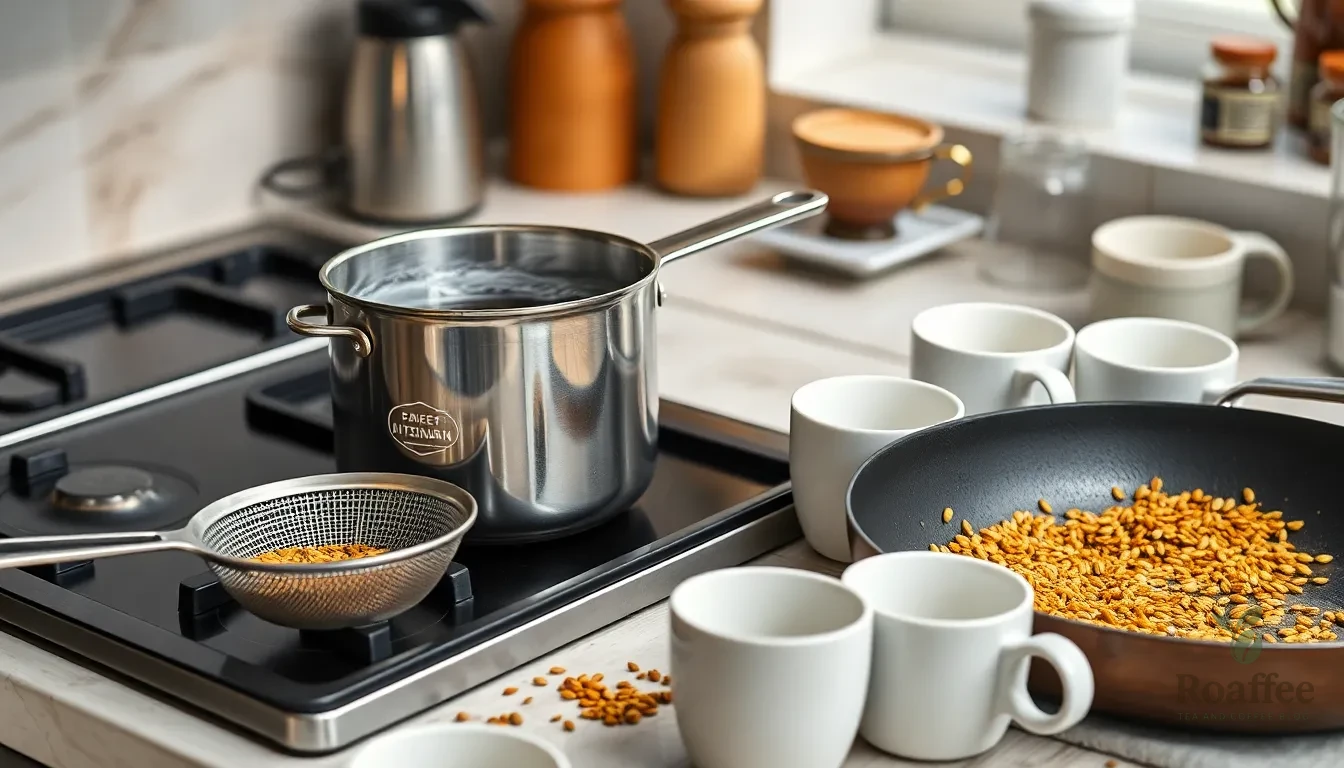
Creating the perfect cup of coriander tea requires minimal kitchen equipment that most home cooks already have on hand. We recommend gathering these essential tools before beginning the brewing process to ensure a smooth and efficient tea-making experience.
A small to medium saucepan serves as the foundation for brewing our coriander tea. The size depends on how much tea we plan to prepare, but a 2-cup capacity works perfectly for most single servings. This vessel allows us to properly boil the water and extract maximum flavor from the coriander seeds.
Fine mesh strainer becomes crucial for achieving a smooth, seed-free tea. We need this tool to separate the steeped coriander seeds from our finished brew, ensuring we get a clean cup without any gritty texture. A small handheld strainer or tea strainer works best for this purpose.
Measuring spoons and cups help us maintain consistency in our tea preparation. Accurate measurements ensure we achieve the same delicious flavor profile every time we brew. We particularly need these for measuring our coriander seeds and water ratios.
A dry pan or skillet becomes useful when we choose to dry roast our coriander seeds before brewing. This optional step releases essential oils and enhances the tea’s aromatic qualities. We recommend using a heavy-bottomed pan for even heat distribution during the roasting process.
Serving mugs or teacups complete our equipment list. We suggest pre-warming these vessels with hot water before straining our tea into them. This simple step helps maintain the tea’s temperature longer and enhances our overall drinking experience.
Optional equipment includes a mortar and pestle for lightly crushing roasted coriander seeds, which can intensify flavor extraction. A teapot also works well for those who prefer a more traditional brewing and serving method.
Instructions
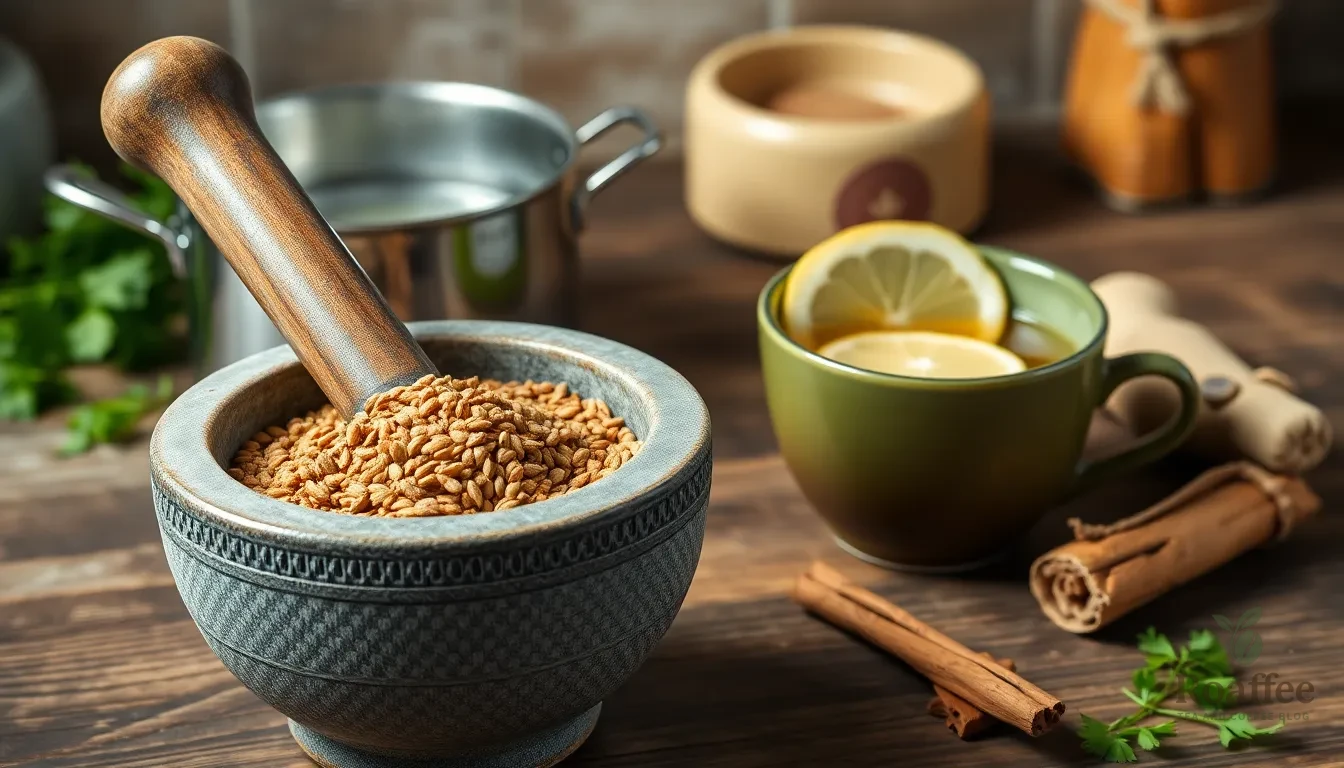
Follow these simple steps to brew a perfect cup of coriander tea that maximizes flavor and health benefits. Our method ensures you extract the full aromatic potential from the coriander seeds.
Prep the Coriander Seeds
Begin by lightly crushing 1 tablespoon of coriander seeds using a mortar and pestle or the flat side of a knife. This crushing action releases the essential oils and aromatic compounds that make our tea so beneficial. We recommend dry roasting the crushed seeds in a pan for 2 to 3 minutes to enhance their flavor profile, though this step remains optional. The seeds should become fragrant and slightly darker when properly roasted.
Boil the Water
Pour 2 cups of filtered water into your saucepan and bring it to a rolling boil over medium high heat. Watch for vigorous bubbling that indicates the water has reached the proper temperature. Using filtered water ensures our tea maintains a clean, pure taste without any unwanted mineral flavors that can interfere with the delicate coriander notes.
Steep the Tea
Add the prepared coriander seeds to the boiling water immediately. Reduce the heat to low and allow the mixture to simmer gently for about 5 minutes. Turn off the heat completely and let the tea steep for an additional 5 to 10 minutes. This extended steeping time extracts the maximum flavor and beneficial compounds from the seeds, creating a more potent and therapeutic brew.
Strain and Serve
Pour the tea through a fine mesh strainer into your pre-warmed cups, removing all the coriander seeds for a smooth drinking experience. Serve the tea warm for optimal taste and digestive benefits. Add optional ingredients like honey for sweetness, fresh ginger for a spicy kick, or a cinnamon stick for warming notes according to your preference. The tea can also be enjoyed cold as a refreshing detoxifying beverage.
Variations
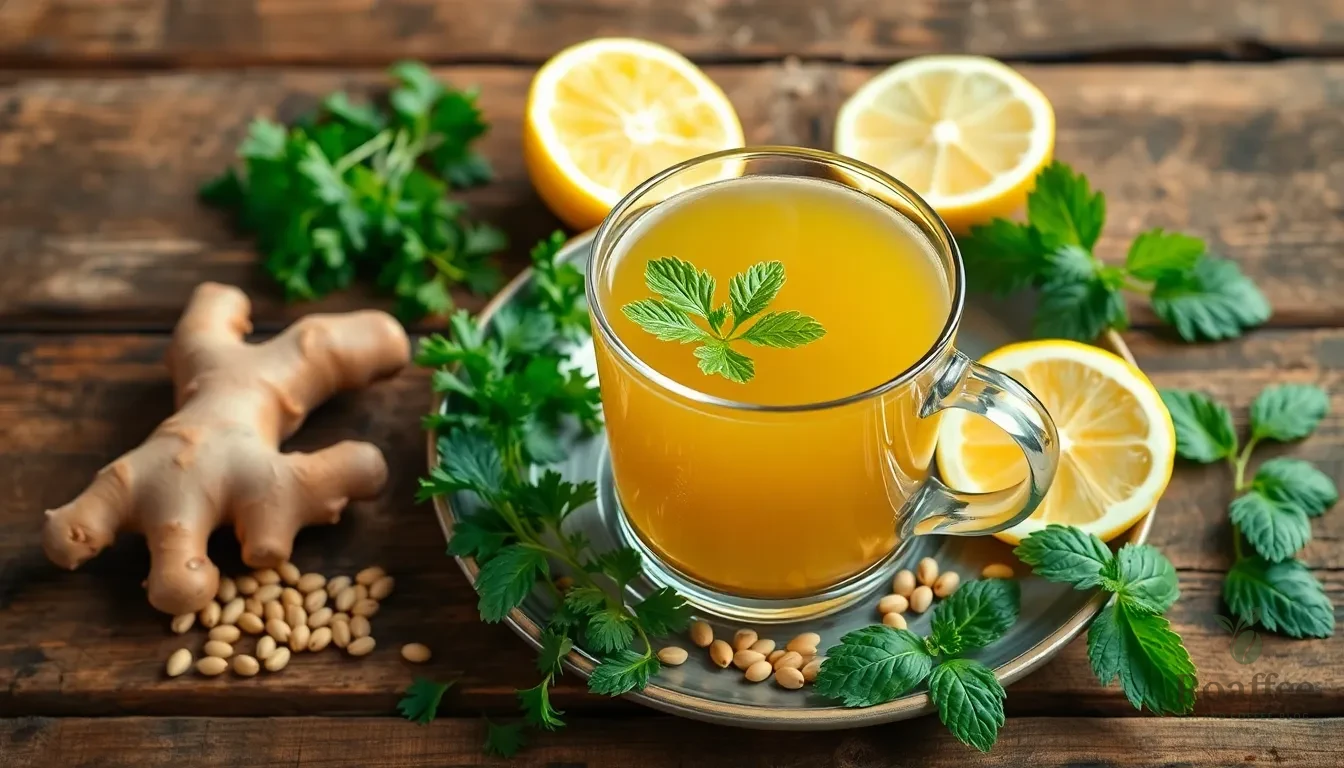
While basic coriander tea offers wonderful digestive benefits, we can enhance its therapeutic properties and flavor profile through thoughtful ingredient combinations. Each variation brings unique health advantages and taste experiences to suit different preferences and wellness goals.
Coriander Ginger Tea
We create this warming and healing blend by combining coriander seeds with fresh ginger slices for enhanced digestive support. Simmer 1 tablespoon coriander seeds with 1/3 cup sliced fresh peeled ginger in 2 cups water for about 20 minutes. The extended simmering time allows both ingredients to release their powerful compounds fully.
Strain the mixture thoroughly and serve hot for maximum warming benefits. We can add milk or your preferred sweetener to create a more soothing beverage. This variation excels during cooler months when we need internal warmth and circulation support.
| Benefits | Details |
|---|---|
| Anti-inflammatory properties | Ginger reduces inflammation while coriander soothes digestion |
| Enhanced circulation | Warming spices stimulate blood flow throughout the body |
| Immune system support | Combined compounds strengthen natural defenses |
| Nausea relief | Ginger’s natural anti-nausea properties complement coriander’s digestive benefits |
Coriander Lemon Tea
We prepare this refreshing variation by adding fresh lemon juice or lemon slices to our basic coriander tea recipe. Brew coriander tea using the standard method, then add 1 to 2 tablespoons fresh lemon juice or 2 to 3 lemon slices while the tea is still warm.
This combination balances Pitta dosha according to Ayurvedic principles while providing a bright, tangy flavor profile. We often pair this variation with cooling herbs like basil or mint for enhanced digestive benefits and flavor complexity.
The citrus addition transforms our tea into a natural detoxifying beverage that works well served either hot or chilled. We recommend this variation during warmer months when we need cooling digestive support.
Coriander Mint Tea
We create this cooling and detoxifying blend by combining coriander seeds with fresh mint leaves during the steeping process. Add 1 tablespoon coriander seeds and 6 to 8 fresh mint leaves to 2 cups boiling water, then steep together for 5 to 7 minutes.
For enhanced flavor, we can include lemon slices and local honey after straining. This combination provides excellent digestive support while offering natural cooling properties that soothe the stomach.
We particularly recommend this variation as a refreshing afternoon beverage or after meals when we need gentle digestive assistance. The mint adds natural cooling effects that complement coriander’s warming digestive properties, creating a perfectly balanced herbal infusion.
This variation serves as an excellent base for more complex blends. We can incorporate fennel seeds, cumin, or peppercorns for additional digestive benefits and flavor depth.
Serving Suggestions

Coriander tea adapts beautifully to different preferences and occasions throughout the day. We recommend serving this aromatic beverage hot as your primary choice for maximum digestive and detoxifying benefits. The warm temperature helps release the essential oils from coriander seeds while providing soothing comfort to your digestive system.
Hot Serving Options
Pour the freshly brewed tea into pre-warmed ceramic mugs or traditional teacups to maintain optimal temperature. We suggest adding honey while the tea remains hot to enhance both flavor and health benefits. Fresh lemon juice creates a bright contrast to the earthy coriander notes when stirred in just before serving.
Cold Preparation Methods
Transform your coriander tea into a refreshing summer beverage by allowing it to cool completely before refrigerating. We find that chilled coriander tea works exceptionally well as a natural detox drink during warmer months. Add ice cubes and fresh mint leaves for an invigorating afternoon refresher that supports healthy digestion.
Enhanced Digestive Blends
Consider combining coriander tea with complementary spices for targeted wellness benefits. We often recommend blending equal parts coriander seeds with cumin and fennel seeds following traditional Ayurvedic practices. This combination creates a powerful digestive support system that addresses common digestive discomforts more effectively than single-ingredient preparations.
Daily Consumption Timing
Serve coriander tea 30 minutes before meals to prepare your digestive system for optimal food processing. We suggest enjoying this herbal infusion between meals as a natural appetite regulator and metabolism supporter. Evening consumption works particularly well when you need gentle digestive relief after heavier meals.
Presentation Ideas
Garnish your coriander tea with a sprinkle of ground coriander seeds or a few fresh cilantro leaves for visual appeal. We recommend using clear glass mugs when serving cold versions to showcase the beautiful golden color of the properly brewed tea.
Storage Tips
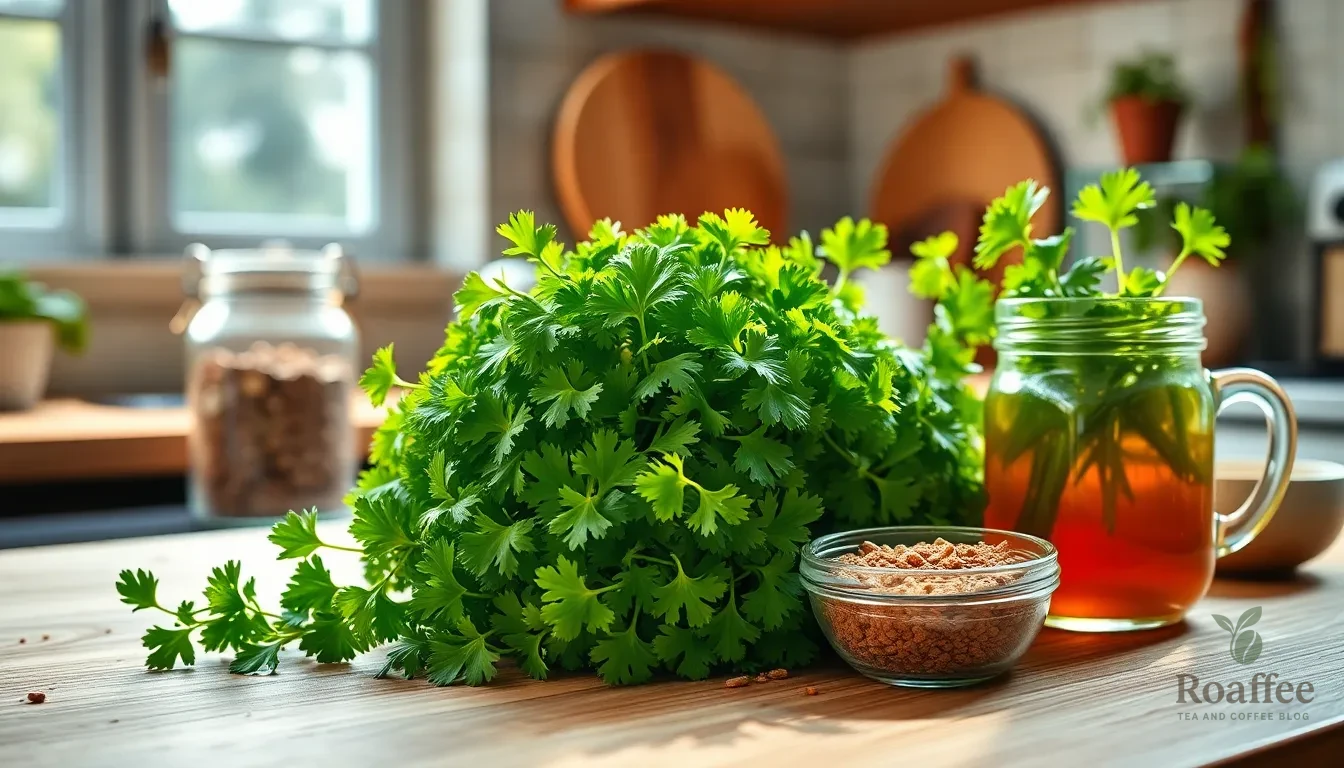
Fresh coriander leaves require proper storage techniques to maintain their quality for tea preparation. We recommend washing the leaves thoroughly in cold water to remove any dirt or sand particles before storage begins.
Refrigerator Storage Methods
Paper towel wrapping provides our preferred method for extending coriander freshness. We wrap the cleaned leaves in paper towels to absorb excess moisture then place them in an airtight container with another layer of paper towels on top. This technique keeps coriander fresh for 2-3 weeks when stored properly.
Water storage offers another effective approach for short-term preservation. We place the coriander stems upright in a glass filled with water then loosely cover the leaves with a plastic bag before refrigerating. This method maintains freshness for approximately 4-5 days.
Long-Term Storage Answers
Freezing extends coriander’s usability for several months. We chop the leaves into small pieces then store them in freezer-safe plastic bags. Frozen coriander can be used directly from the freezer when brewing tea without requiring thawing.
Drying for Tea Preparation
Dried coriander leaves create an excellent tea base that stores for extended periods. We spread clean leaves on a tray and place them in a warm airy location or use a dehydrator set between 100-120°F. The leaves should become crisp and brittle when properly dried.
Proper storage containers ensure dried coriander maintains its potency. We store the completely dried leaves in airtight jars placed in cool dark locations. This preservation method allows us to enjoy coriander tea throughout the year regardless of fresh availability.
| Storage Method | Duration | Best For |
|---|---|---|
| Paper towel wrap | 2-3 weeks | Regular tea brewing |
| Water storage | 4-5 days | Quick consumption |
| Freezing | Several months | Long-term storage |
| Dried leaves | 6-12 months | Year-round tea preparation |
Health Benefits
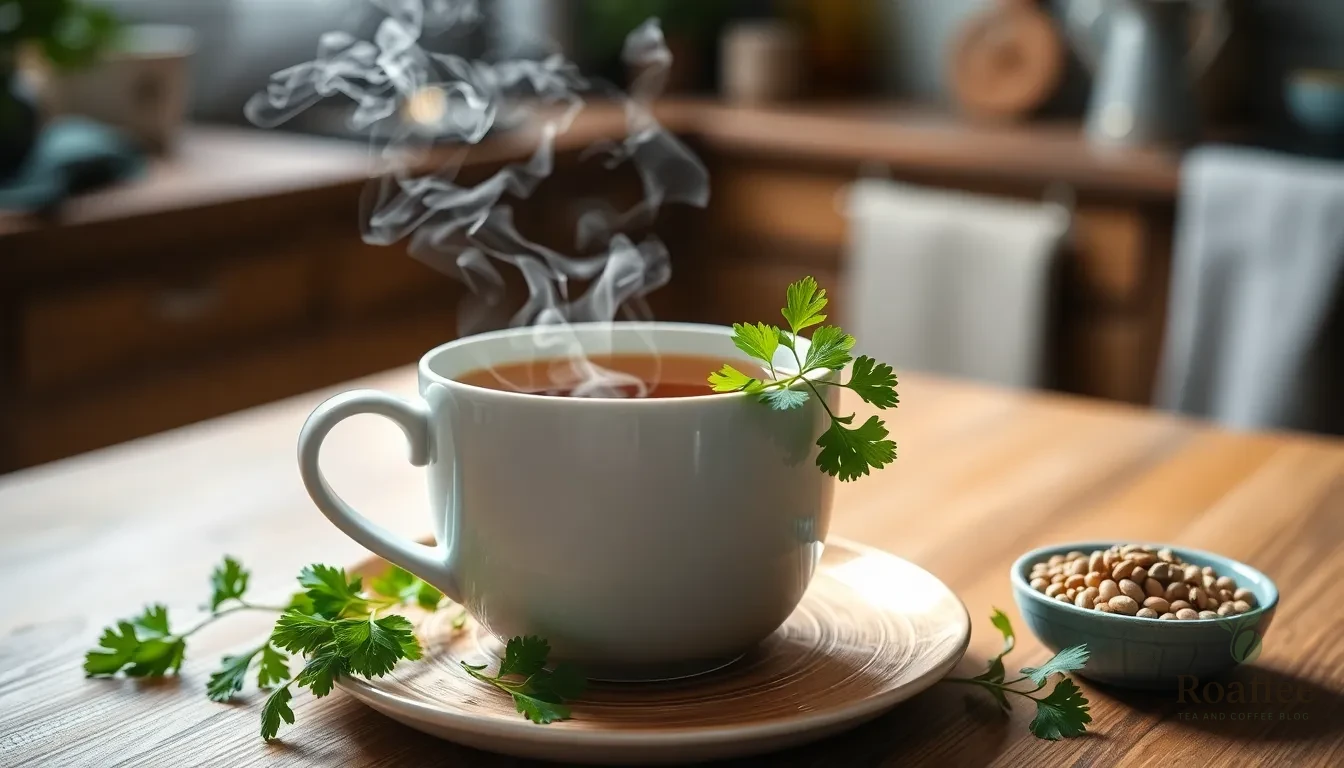
Beyond its delightful flavor and aromatic properties, coriander tea offers a remarkable array of health benefits that make it a valuable addition to our daily wellness routine.
Rich Source of Essential Nutrients
Coriander seeds provide our bodies with a concentrated dose of vital nutrients and antioxidants. This powerhouse herb contains protein, manganese, magnesium, iron, dietary fiber, and vitamin A, all contributing to its impressive medicinal properties. These nutrients work together to support various bodily functions and promote overall health.
Supports Optimal Eye Health
The vitamin A content in coriander plays a crucial role in maintaining our vision and eye health. This essential nutrient supports corneal function and helps our eyes adapt to low light conditions. Also, the antioxidants present in coriander tea help protect against eye diseases and age-related vision problems.
Promotes Digestive Wellness
We can rely on coriander tea to support our digestive system naturally. This herbal infusion promotes healthy digestion and regular bowel movements while acting as a gentle appetite stimulant. Traditional use and animal studies support coriander’s effectiveness in improving gut health and reducing digestive discomfort.
Protects Heart Health
Regular consumption of coriander tea contributes to cardiovascular wellness by helping reduce bad cholesterol (LDL) levels while increasing beneficial cholesterol (HDL). This dual action potentially lowers our risk of heart disease. The herb’s strong flavor also enables us to reduce sodium intake in our diet, providing additional cardiovascular benefits.
Offers Neuroprotective Properties
Research reveals that coriander possesses antioxidant, anxiolytic, sedative, and anticonvulsant properties that protect our brain tissues from oxidative damage. These neuroprotective effects help improve neurological health and may support cognitive function as we age.
Enhances Metabolic Function
The polyphenols in coriander contribute to powerful antioxidant activity that supports our liver and kidney function. This protection reduces oxidative stress throughout our body and may help combat metabolic syndrome and diabetes. These metabolic benefits make coriander tea an excellent choice for supporting our body’s natural detoxification processes.
Conclusion
We’ve discovered that coriander tea offers a simple yet powerful way to enhance our daily wellness routine. This aromatic herbal infusion transforms ordinary coriander seeds into a therapeutic beverage that’s both delicious and beneficial for our health.
The versatility of coriander tea makes it perfect for any season or time of day. Whether we’re seeking digestive relief after meals or looking for a refreshing summer drink we can enjoy it hot or cold according to our preferences.
With minimal equipment and ingredients that are likely already in our kitchen we can easily incorporate this ancient remedy into our modern lifestyle. The various flavor combinations and serving suggestions ensure we’ll never get bored with our daily cup.
Start brewing your own coriander tea today and experience the natural benefits this humble spice has to offer. Your body will thank you for choosing this wholesome alternative to processed beverages.
Frequently Asked Questions
What is coriander tea and what are its main benefits?
Coriander tea is a herbal infusion made from coriander seeds that has been used across cultures for digestive wellness. Its main benefits include soothing upset stomachs, supporting healthy cholesterol levels, promoting eye health, and providing anti-inflammatory properties. The tea is rich in essential nutrients like manganese, magnesium, iron, and vitamin A, making it a natural alternative to expensive supplements.
What ingredients do I need to make coriander tea?
The basic ingredients include 1 tablespoon of whole coriander seeds and 2 cups of filtered water. Optional additions include honey for sweetness, lemon juice for brightness, and flavor enhancers like fresh ginger, mint leaves, cinnamon, or fennel seeds. Using whole coriander seeds is recommended for optimal flavor and health benefits.
What kitchen equipment is needed to brew coriander tea?
Essential equipment includes a small to medium saucepan, a fine mesh strainer, and measuring spoons and cups. Optional tools include a dry pan for roasting seeds, a mortar and pestle for crushing, and a teapot for traditional brewing. Pre-warming serving mugs helps maintain the tea’s temperature.
How do I prepare coriander tea step by step?
Start by lightly crushing 1 tablespoon of coriander seeds to release essential oils. Optionally dry roast them for enhanced flavor. Boil 2 cups of filtered water, add the seeds, and steep for 5-10 minutes. Strain into pre-warmed cups and serve warm with optional honey, ginger, or cinnamon additions.
What are the popular variations of coriander tea?
Popular variations include Coriander Ginger Tea for enhanced digestive support and warming benefits, Coriander Lemon Tea for a refreshing detoxifying beverage, and Coriander Mint Tea for cooling digestive support. Each variation offers unique therapeutic properties and can be customized with additional spices for complex flavors.
When is the best time to drink coriander tea?
Coriander tea is best consumed 30 minutes before meals or between meals to regulate appetite and support metabolism. It can be enjoyed hot for maximum digestive benefits or cold as a refreshing summer drink. The tea works well as an afternoon beverage or after meals for digestive support.
How should I store coriander seeds and leaves for tea preparation?
Store whole coriander seeds in airtight containers in a cool, dry place to maintain potency. For fresh coriander leaves, wash thoroughly and wrap in paper towels for refrigerator storage (2-3 weeks) or place stems in water for short-term use. Leaves can be frozen or dried for long-term storage.
Are there any special serving suggestions for coriander tea?
Serve hot for maximum digestive benefits or cold for refreshing summer drinks. Combine with spices like cumin and fennel for enhanced digestive support. Garnish with ground coriander or fresh cilantro leaves for visual appeal. The tea pairs well with cooling herbs like basil or mint in warmer months.









